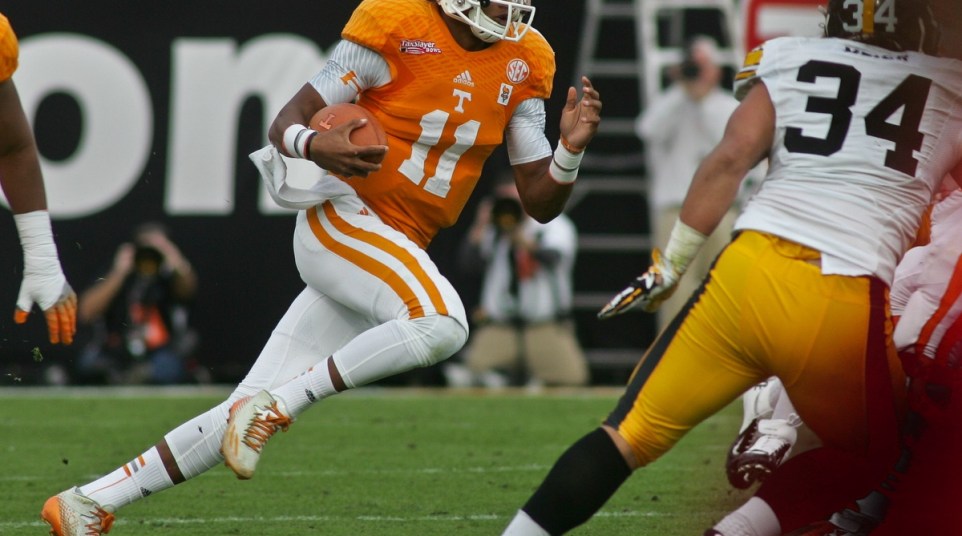Dobbs/DeBord combo pushing for faster tempo at UT
Tennessee fans who cheered a little inside when offensive coordinator Mike Bajakian left to become quarterbacks coach for the Tampa Bay Bucs (and new No. 1 pick Jameis Winston) may be disappointed this fall.
Mike DeBord, yanked from an administrative job at the University of Michigan at the tail end of the coaching carousel to fill the position, didn’t even change the Vols’ offensive terminology.
UT will execute the same power spread, utilizing the athleticism of Josh Dobbs, a good one-two combination out of the backfield in Jalen Hurd and Alvin Kamara, and a cadre of athletic receivers who can catch screens and make something by turning upfield.
No, the biggest upgrade isn’t personnel or plays, though a more experienced, deeper offensive line and a healthier group of wideouts should help. DeBord’s No. 1 general priority, judging from his comments throughout spring practice, is to get the offense operating at a breakneck tempo.
“Without a doubt, the tempo of practice (at Tennessee) is the fastest I’ve ever been around,” DeBord told reporters during his first media session of the spring. “In the NFL, the coaches I worked for there, they were big into tempo and going fast and all that, but nothing like what Butch has. And at Michigan, we practiced fast, but again, it wasn’t ever like this. I love it. It really makes the players concentrate.”
In college, when players don’t spend 12 hours a day at the football facilities, efficiency equals fast. The decision to retain last year’s playbook with only some minor tweaks, along with the return of so many offensive starters, will allow Tennessee to move quickly between snaps.
Dobbs’ brain, the same one that’s put him on track to get his degree in aerospace engineering and recite the first several dozen digits of the irrational number “Pi,” should be another catalyst toward faster offensive tempo.
Check out this recent anecdote on Dobbs’ knowledge of the offense, as reported by ESPN.com’s Alex Scarborough:
“Hold up!” Jones says abruptly, stopping the team meeting midstride. “Josh Dobbs, stand up.”
Jones says it’s first-and-goal from the 8-yard line. It’s late in the game, and Tennessee needs a touchdown to win.
“What’s your call?” he asks.
“What’s the formation?” Dobbs responds.
An assistant sets up the mental rep.
“What’s the coverage?” Dobbs asks, wanting more.
Some kind of zone. Maybe a mixed cover-zone look. There’s not enough time to jot it down before Dobbs answers.
By the time the call is out of Dobbs’ mouth, Jones changes the down and distance. Dobbs fires back with another play. In what feels like 30 seconds, coach and quarterback dial up four plays in four different scenarios. Not once does Dobbs look down at his notes. Not once does he stutter.
Dobbs and true freshman offensive tackle Jack Jones both mentioned tempo after the spring game.
As if it wasn’t obvious already, here’s what DeBord had to say about tempo toward the end of spring, courtesy of 247Sports: ““The tempo of the practice has been the biggest thing, just the speed of everything that way. That’s been interesting in a lot of ways. I’m just pushing players to go as fast as we can on and off the field, and also in their play.
“We’re trying to go as fast as we can. It all depends on the play and the tempo and all that stuff, but a lot of times we like to be 20 seconds or more on the clock (at the snap).”
Shh. Don’t tell Bret Bielema.
If the Vols are able to ratchet up the pace of play, it should make it even more difficult for defenses to set up to stop Hurd or Kamara out of the backfield. And if opposing coordinators put too many players near the line of scrimmage, Dobbs should begin to read coverages fast enough to take advantage.
Tennessee’s offense won’t be perfect this season. Dobbs still must develop, the offensive line is a ways off from best in the SEC and the receivers seem injury-prone. But upping the tempo is a smart strategy that should help Team 119 maximize its assets on offense.

